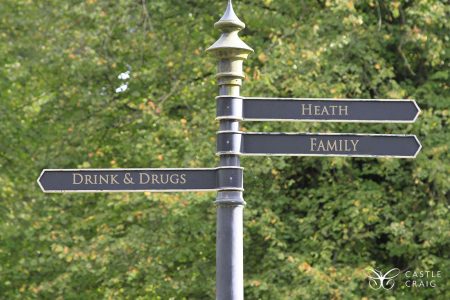Any drug, and this includes alcohol and prescription medication, can lead to addiction if you take it in large amounts or for long periods of time. However, some drugs are more addictive than others, and some can cause addiction after using them just a couple of times.
Here we discuss the most addictive drugs, explore the reason behind drug misuse and addiction and explain when you need help and how to get it.
What is Drug Addiction?
Drug addiction is when you are no longer in control of the substance you are taking and it is in control of you. This situation can be difficult to recognise let alone admit and you may be in denial, especially if you are using prescription drugs, cigarettes or alcohol, not taking illegal drugs.
The stigma around drug addiction often leads the public to picture addicts as homeless, poorly educated, involved in crime; but drug addiction can mean drinking a bottle or two of wine with your dinner every night, dropping an E every weekend, taking more painkillers than prescribed or leaving work every couple for hours for a cigarette break.
When you stop taking addictive drugs, whether they’re legal or not, you experience withdrawal symptoms which only stop when you start taking drugs again. This is the spiral of addiction and it can affect anyone.
Here are the top four most addictive drugs.
Alcohol
Raising a glass, bringing some cheer, drowning your sorrows: drinking alcohol is such a large part of life that you may forget alcohol is one of the most addictive drugs around.
Alcohol abuse can be subtle. You might enjoy a few glasses with dinner every night or a few beers down the pub and not think anything of it. But if you couldn’t imagine a life without alcohol that is alcohol addiction.
Alcohol addiction kills more than three million people a year worldwide and one in 20 of all deaths can be attributed to alcohol misuse. It can be difficult to stop drinking when alcohol is so widely available, but if you think you have a reliance on alcohol you might have an alcohol problem.
Cocaine
Cocaine, ‘coke’ or ‘Charlie’ is a status symbol as it’s expensive and often favoured by high earners. But like all addictive drugs, it has a devastating impact on your life, your finances, and your physical health as it can damage vital organs including the heart.
It is psychoactive, meaning it affects the way you think and behave. It blasts you with the feel-good hormone dopamine, making you feel euphoric and craving more. It is easy to build up a tolerance to cocaine, which means you need more and more to get the same high. But after the high comes the crash and those dreadful withdrawal symptoms.
Crack cocaine, which comes in rock form and is usually smoked with a crack pipe, tends to have a much shorter high than cocaine, which makes it even more addictive. If you take cocaine or crack cocaine regularly you are up to eight times more likely to die than other people of the same age and gender as you.
Contact Us Today
Your path to lasting recovery starts here
Nicotine
The younger you start smoking, the more likely you are to become addicted. A study found that in America nine out of 10 smokers start before the age of 18. Nicotine is one of the most addictive substances and although the majority of smokers want to quit, only around six per cent are able to give it up in a given year.
Not everything is understood about the addictive substances in cigarettes, with some studies exploring chemicals in cigarette smoke that could contribute to it being so enticing.
Smoking leads to many illnesses including lung cancer and stroke. Due to multiple everyday smoking triggers (from having a coffee to feeling stressed), going cold turkey is not an option for many, and therapy treatments may be the only way to kick tobacco once and for all.
Heroin
Heroin is one of the most addictive drugs and you only need to take it a couple of times to be hooked. It is second to alcohol in being the most harmful drug worldwide in terms of its effect on health and society.
Heroin addiction is often treated with methadone maintenance – a prescribed substitute. However, while you can be weaned off the illegal drug this way, this drug treatment doesn’t tackle the reason behind the addiction and people are often left on methadone maintenance indefinitely, which has its own health risks.
If you are struggling with heroin addiction it is difficult, if not impossible, to kick your habit without expert addiction treatment. Withdrawal symptoms from this type of drug misuse are strong and can take effect within hours of your last hit, which makes them difficult to manage without drug addiction treatment.
What Makes a Drug Addictive?
Drug addiction is a disease that makes you compelled to take drugs and become unable to stop. It isn’t simply a case of being weak, having no willpower or having loose morals.
Most drugs target the ‘reward circuit’ in the brain, flooding it with the feel-good chemical dopamine that makes you feel euphoric. When that wears off – especially if it is supplanted by unpleasant withdrawal symptoms – you crave more. And so the spiral of drug misuse and addiction begins.
As drug misuse continues, the brain adapts and becomes more tolerant and you need more of the drug to reach the same high. This means it becomes harder to stop taking it without drug addiction treatment.
What is the Oldest Drug?
Drugs have always had their place in history and it may come as no surprise to discover that the two oldest addictive drugs are still two of the most popular today.
Alcohol is the world’s oldest recreational drug and mead, which is made from fermented honey, was first used in 8,000 BC.
When it comes to illegal drugs, the ancient Sumerians took opium, which is made from poppies, in about 5,000 BC. Opium is the basis for opioid drugs such as heroin and morphine.

Discover How We Can Help You
What are the Six Components of Drug Addiction?
Drug or alcohol addiction doesn’t happen overnight and they don’t happen after one hit or one drink. What early exposure to drugs and alcohol does, though, is make you feel a certain way and you want to feel that way again.
Maybe a drink relaxes you and gives you confidence; a chemical high allows you to party all weekend; the energy for your busy job is fuelled by regular lines of cocaine; or punishing back pain is alleviated only with large amounts of prescription painkillers.
Here is the journey from occasional use of addictive substances to drug addiction or alcohol misuse:
- Salience: alcohol or other drugs start to become an important part of your life. Maybe you are ‘living for the weekend’ or looking at how you can stock up on extra prescription medicines ‘just in case’.
- Mood modification: you love how the drugs or alcohol make you feel: free of worries and relaxed. You want to feel that way more often so you start taking more.
- Withdrawal symptoms: you decide to stop taking drugs or stop drinking but then the sweats and the shakes start and you’re depressed and angry. The only relief is to return to addictive substances.
- Increased tolerance: whether it’s an illegal drug or a prescription medicine, you build up a tolerance and need more to achieve the same result.
- Conflict: drug addiction impacts negatively on all aspects of your life: your family, partner, job and health. You’re no longer reliable and you’re getting into debt to fund your drug misuse.
- Relapse: without drug addiction treatment, 70% of people with a substance use disorder get caught in a spiral of addiction, withdrawal symptoms and relapse.
Is Addiction Connected with Mental Health Disorders?
Dual Diagnosis
It is very common for someone with a drug or alcohol addiction to have a diagnosed mental health or psychiatric disorder. Often people turn to alcohol as a form of self-medication for this.
Psychiatric disorders and drug addiction often co-exist in the same person and one disorder influences the other. You feel depressed so you reach for the drugs but the come-down makes you feel even more depressed. So you reach for the drugs again.
People with dual diagnosis often ‘fall through the cracks’ in the healthcare system and don’t get the help that is needed. This is why addiction treatment is so important. It doesn’t just tackle the physical dependency to addictive drugs but the underlying reasons behind it.
What is Dual Addiction?
Dual addiction or ‘polysubstance misuse disorder’ is a dependency on two addictive drugs and is very common and is sometimes not easily identified. You may be in denial about your alcohol addiction because you don’t consider a bottle of wine every night to be a problem, and a recent back problem means you are also taking more prescription painkillers than you should be. Or maybe you are taking cocaine during the day and smoking weed at night to sleep. That is polysubstance misuse disorder.
Or with behavioural addictions – You might be misusing drugs and then taking part in compulsive gambling to fund your addiction. What started off as having a bit of a fun once a year is now a get-rich-quick-scheme. Before you know it your house is at risk and the only way you can sleep at night is by taking sleeping pills.
If you have a dual addiction, the chances of you successfully completing addiction treatment is lower than if you had one addiction and you are more likely to require inpatient detox or residential prescription drug rehab to help bring you on the road to recovery.
How to Reach out for Help
The first thing you need to know is that you are not alone. Addiction can be embarrassing, especially if you are dependent on prescription medication and have never touched an illegal drug in your life.
See if you can confide in a friend to share the load. Contact your GP and see if they offer help, or signpost you to organisations that may help you. Seek out self-help groups such as AA, NA or CA either online or across towns and cities over the world. In many cases drug addiction is a sign of other problems – such as mental health issues, such as borderline personality disorder, ADHD or Autism Spectrum Disorder with addiction. Assessing and treating the root cause is an important part of drug addiction treatment.
If you have an addiction, the safest and most successful way of tackling it is with expert addiction treatment. With this you can ensure you’ll be kept safe while experiencing withdrawal symptoms, you’ll be given develop strategies to help with triggers to avoid relapse and you’ll have ongoing support so you stay clean for good.

Free Addiction Assessment
When Do You Need Treatment?
Addiction is not an exact science and you don’t wake up one day and realise you have a problem. In fact you may never admit you have a substance use disorder, especially if you’re mixing with like-minded people.
If you no longer feel in control of the addictive substances you’re taking and they are in control of you, you need urgent treatment.
In the same way that addiction affects people differently, not everyone responds to addiction treatment in the same way. Whatever your drug – whether you’re battling a heroin or crack cocaine addiction, or a reliance on other drugs, or alcohol – the type of addiction treatment you have depends on you and your situation.
Outpatient treatment means you carry on with your life, living at home, continuing to work, and receiving treatment at times convenient to you. Inpatient treatment requires you to move into treatment centres, which have hotel facilities, and receive 24/7 medical and therapeutic care.
If you are dependent on two or more addictive substances the chance of you relapsing is 1.5 times greater than if you have one. Similarly, if you have a dual diagnosis (such as heroin addiction and mental health issues), you are also more likely to relapse. For these reasons, moving into treatment centres with their wraparound care, gives you the greatest chance of detoxing, stabilising your mood, joining a fellowship of recovery for life, and learning coping techniques that you can apply to everyday life outside of rehab.
Whatever your relationship with addictive drugs, there is help out there. You just need to ask.





References
- Kranzler H R, Li T-K, (2008), What is Addiction? Alcohol Res Health: 31 (2) 93-95
- World Health Organization, (2018), Harmful Use of Alcohol Kills More Than 3 Million People Each Year, Most of Them Men
- Nestler E J, (2005), The Neurobiology of cocaine Addiction, Sci Pract Perspect: 3 (1) 4-10
- Why People Start Smoking and Why It’s Hard to Stop, (2022), American Cancer Society
- Is Nicotine Addictive?, (2022) National Institute on Drug Misuse
- Nehlin C, Willebrand M, Wollert Brander C, et al, (2020), Overcoming Heroin Addiction Without the use of Pharmaceuticals: a Qualitative Interview Study, Journal of Psychoactive Drugs: 211-217
- National Institute on Drug Misuse, (2018), Understanding Drug Use and Drug Addiction
- Surgeon General’s Report on Alcohol, Drugs and Health, (2016), The Neurobiology of Substance Use, Misuse and Addiction: SurgeonGeneral.Gov
- Sussman S, Lisha N, Griffiths M, (2011), Prevalence of the Addictions: a Problem of the Majority or the Minority? Eval Health Prof: 34 (1) 3-56
- Woody G, (1996), The Challenge of Dual Diagnosis, Alcohol Health Res World: 20 (2), 76-80
- Witkiewitz K, Vowles K E, (2018), Alcohol and Opioid Use, Co-Use and Chronic Pain in the Context of the Opioid Epidemic: a Critical Review, Alcohol Clin Exp Res: 42 (3) 478-488
- Kranzler H R, Li T-K, (2008), What is Addiction? Alcohol Res Health: 31 (2) 93-95
- Kabisa E, Biracyaza E, d’Amour Habagusenga J, et al, (2021), Determinants and Prevalence of Relapse Among Patients With Substance Use Disorders: a Case of Icyizere Psychotherapeutic Centre, Substance Misuse, Treatment, Prevention and Policy: 16 (13)
- Andersson H W, Wenaas M, Nordfjaern T, (2019), Relapse After Inpatient Substance Use Treatment: a Prospective Cohort Study Among Users of Illicit Substances, Addictive Behaviors: 90, 222-228



